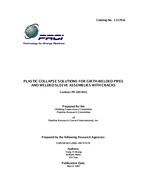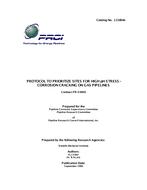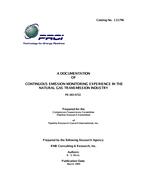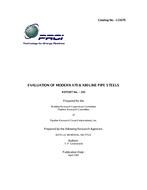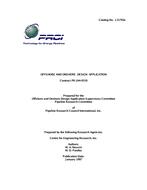Provide PDF Format
PRCI PR-185-9431
- Plastic Collapse Solutions for GW Pipes and Sleeves
- Report / Survey by Pipeline Research Council International, 03/10/1997
- Publisher: PRCI
$198.00$395.00
L51761e
Edison Welding Institute
Need: All welded structures enter service containing some flaws or imperfections. These may range from volumetric indications, such as inclusions and porosity, to planar flaws, such as lack of side-wall fusion or hydrogen cracking. Depending on the form of applied loading and the operating environment, a flawed structure may fail by a number of different modes. For static loading, the extreme failure modes are brittle fracture (fracture preceded by minimal plastic deformation) and plastic collapse (plastic overloading of the remaining ligament of a cracked body). To prevent such failures, it is imperative that a fitness-for-service (FFS) assessment methodology include the capability to analyse both failure modes. The existing FFS assessment procedures in API 1104 are based solely on fracture considerations. In comparison, the FFS assessment procedures included in the CSA Z662 are based on both fracture and plastic collapse considerations. Other assessment procedures, such as PD6493:1991 CEGB R-6Rev3, and the GE/EPRI J Estimation scheme consider the plastic collapse as an integral part of the assessment methodology. Although FFS assessment procedures based on fracture considerations should, in general, produce conservative assessments, plastic collapse may be the limiting failure mode in certain cases. As a result, it is Important to develop plastic collapse assessment procedures for both pipeline girth welds and welded sleeve assemblies to enable development of comprehensive FFS assessment procedures.
Result: The results of this project developed plastic collapse solutions for girth-welded and welded sleeve assemblies with circumferential cracks. The first phase of this project involved nonlinear finite element analysis (FEA) of pipes with circumferential cracks of different size. Provisional plastic collapse solutions were developed based on a large number of analyses. The second phase of this project involved full-scale tests of two 16-in. (406-mm) X60 pipes with circumferential cracks at the fillet weld toe of full-encirclement sleeves. The pipes were loaded by internal pressure and lateral four-point bending until burst at the crack locations. The loads at failure were recorded and compared with the provisional solutions developed in Phase 1 of the project. Other commonly used plastic collapse solutions were examined in both Phases 1 and 2 to determine their relative degree of conservatism.
Benefit: The project considered over 120 cases of circumferentially-cracked pipes that were analyzed under a variety of loading conditions. The provisional plastic collapse solutions were developed by first identifying the most accurate solutions available for girth-welded pipes under pure lateral bending. Six available solutions were reviewed and recommended within the body of this study.
Edison Welding Institute
Need: All welded structures enter service containing some flaws or imperfections. These may range from volumetric indications, such as inclusions and porosity, to planar flaws, such as lack of side-wall fusion or hydrogen cracking. Depending on the form of applied loading and the operating environment, a flawed structure may fail by a number of different modes. For static loading, the extreme failure modes are brittle fracture (fracture preceded by minimal plastic deformation) and plastic collapse (plastic overloading of the remaining ligament of a cracked body). To prevent such failures, it is imperative that a fitness-for-service (FFS) assessment methodology include the capability to analyse both failure modes. The existing FFS assessment procedures in API 1104 are based solely on fracture considerations. In comparison, the FFS assessment procedures included in the CSA Z662 are based on both fracture and plastic collapse considerations. Other assessment procedures, such as PD6493:1991 CEGB R-6Rev3, and the GE/EPRI J Estimation scheme consider the plastic collapse as an integral part of the assessment methodology. Although FFS assessment procedures based on fracture considerations should, in general, produce conservative assessments, plastic collapse may be the limiting failure mode in certain cases. As a result, it is Important to develop plastic collapse assessment procedures for both pipeline girth welds and welded sleeve assemblies to enable development of comprehensive FFS assessment procedures.
Result: The results of this project developed plastic collapse solutions for girth-welded and welded sleeve assemblies with circumferential cracks. The first phase of this project involved nonlinear finite element analysis (FEA) of pipes with circumferential cracks of different size. Provisional plastic collapse solutions were developed based on a large number of analyses. The second phase of this project involved full-scale tests of two 16-in. (406-mm) X60 pipes with circumferential cracks at the fillet weld toe of full-encirclement sleeves. The pipes were loaded by internal pressure and lateral four-point bending until burst at the crack locations. The loads at failure were recorded and compared with the provisional solutions developed in Phase 1 of the project. Other commonly used plastic collapse solutions were examined in both Phases 1 and 2 to determine their relative degree of conservatism.
Benefit: The project considered over 120 cases of circumferentially-cracked pipes that were analyzed under a variety of loading conditions. The provisional plastic collapse solutions were developed by first identifying the most accurate solutions available for girth-welded pipes under pure lateral bending. Six available solutions were reviewed and recommended within the body of this study.
Related Products
PRCI PR-003-9403
Protocol to Prioritize Sites for High pH Stress-Corrosion Cracking in Gas Pipelines..
$448.00 $895.00

